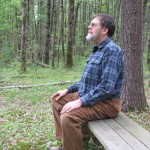I was recently at Jeff Lilly’s Druid Journal, and a post and comments thread there evoked something from me I’ve been trying to say since summer, though it has never come out right before. Maybe it isn’t right even yet, but it’s the closest I’ve come…
As we’ve written before, Peter and I deliberately sought out workshops and activities at New England Yearly Meeting this past August that we hoped would be challenging to us. Obviously, we’re what would have to be termed, not just liberal Quakers, but universalist Quakers. At different times and in different ways, Peter and I both have taken a look at Christianity, as it is currently practiced and understood in our culture, and determined that, to say the least, it did not “speak to our condition.” I’ve never been Christian–Peter was at one time, but walked away. (That’s a story I hope he’ll share some day, so I won’t touch on it here, for him.)
Instead, the religious path that allowed us to experience connection with the world of Spirit has been, for the past twenty or so years, Pagan. And it’s been challenging to us, since becoming Quakers, to be open to Spirit among Friends in whatever forms it chooses to speak to us. Since becoming Friends, and particularly since being impressed by the ways that even the most evangelical of Friends do seem led by a Spirit of peace, we’ve both worked to become more open to Christian insights, perspectives, and language within the Society of Friends. We’re trying to become spiritually bilingual, in other words.
That led us to workshops like Eden Grace’s on Quaker missionary work (a loaded term chosen deliberately, so we could discuss its implications, as it turned out) and, in my case, to attending the Bible half-hours, led by Benigno Sanchez-Eppler. I was suprised to find myself less challenged than embraced by the direction those half-hours took, and I’ve been wrestling ever since to find a way of putting into my own words what was most powerful and moving for me, in what he had to say.
Today, at Jeff Lilly’s blog, I came as close as I have managed yet. I wrote:
I really believe you’re onto something with the idea of “belief communities” and the idea that our beliefs are like multiple languages, which we can speak “with other people that have beliefs roughly compatible with yours, just as you can speak with people who speak the same language as you do.”
I had a really profound experience this summer, listening to a Cuban American Quaker minister speak on what’s it’s like to have a rich, active spiritual life with roots in (literally) two languages, since his spiritual development occurred in Spanish in his youth and in English in his adulthood. Some of the language with which he has mapped his spiritual experiences does not translate well from one tongue to the next, and, to truly communicate his deepest experiences, he finds he must have access to to both languages at once–something linguists apparently term code switching. The point Benigno made over and over again was that “code switchers are not confused.” And what I believe he meant–what seemed clear from the context, where he was discussing tensions between strictly Christ-centered Quakers and universalist Quakers, like myself, who draw upon many religions traditions in understanding our spiritual leadings–was that those whose religious experiences span multiple mythologies or traditions are not playing pick-and-choose, designer-style spirituality. (Though we are often accused of doing so.) Rather, we are code-switching–using the metaphorical language best suited to reflecting the lived spiritual experience we are trying to convey.
I am not saying that God or the gods or Spirit is a metaphor–the first conclusion people jump to once you bring in ideas of metaphor when discussing religious truth. (You even did this a bit yourself, Jeff, in your original post.) Instead, I’m saying (as I think you were implying, in your Feynman quote on Quantum Mechanics) that, because we humans don’t understand the gods (Quel suprise! Humans don’t understand the ground of all being and ultimate meaning of the cosmos??? How shocking!) we only ever understand them through metaphors–imprecise, inadequate, but powerful echoes of a reality we can only dimly touch.
Some of us have heard the voice of Spirit speaking in many different metaphorical/mythological “languages.” We have become bilingual through experience. We are code-switchers, and it can be hard for us to communicate in ways that others will hear and respect.
But we are not confused–except to the extent that all of us, attempting to meet the eyes of God, necessarily are…
I haven’t really tried to capture the sense of Jeff’s post, on the nature of religious truth, and I know I haven’t done anything like full justice to Benigno’s ministry this summer. But this, at least, is a part of what I’ve been laboring to say about what I took away from this summer’s sessions of NEYM.
For those who are curious about Benigno’s talks, I believe that New England Yearly Meeting has recordings of those half-hours. (Peter and I have received a set, though I haven’t had a chance to listen to them again–partly because I am afraid that, like so much of the magic of a spiritually-charged moment, it will not have made the translation to a mere audio-recording.) And Jeff Lilly’s thread on the nature of religious truth–including his question regarding whether or not, spiritually speaking, there is in fact a Santa Claus, is also available for you to read.
PS: For those following the situation with Eden and Jim Grace, the blog among Friends has posted a series of articles, including a very recent email from Eden, describing a very tense and difficult situation, though she and her family are currently in a safe place; a link to a photo gallery of recent pictures from Kenya, showing some of the destruction; and a suggestion on some ways to offer monetary relief to Kenya, as well as, of course, our prayers, vigils, or spells. There is also a good summary of the history of the divisions in Kenya up at Peggy Senger Parsons’ A Silly Poor Gospel, written by David Zarembka, Coordinator of the African Great Lakes Initiative/ Friends Peace Teams, who lives in Western Kenya. Parsons’ blog has other excerpts of news which may be of interest, too.
May there be peace–in our hearts, in our villages, in our world.















